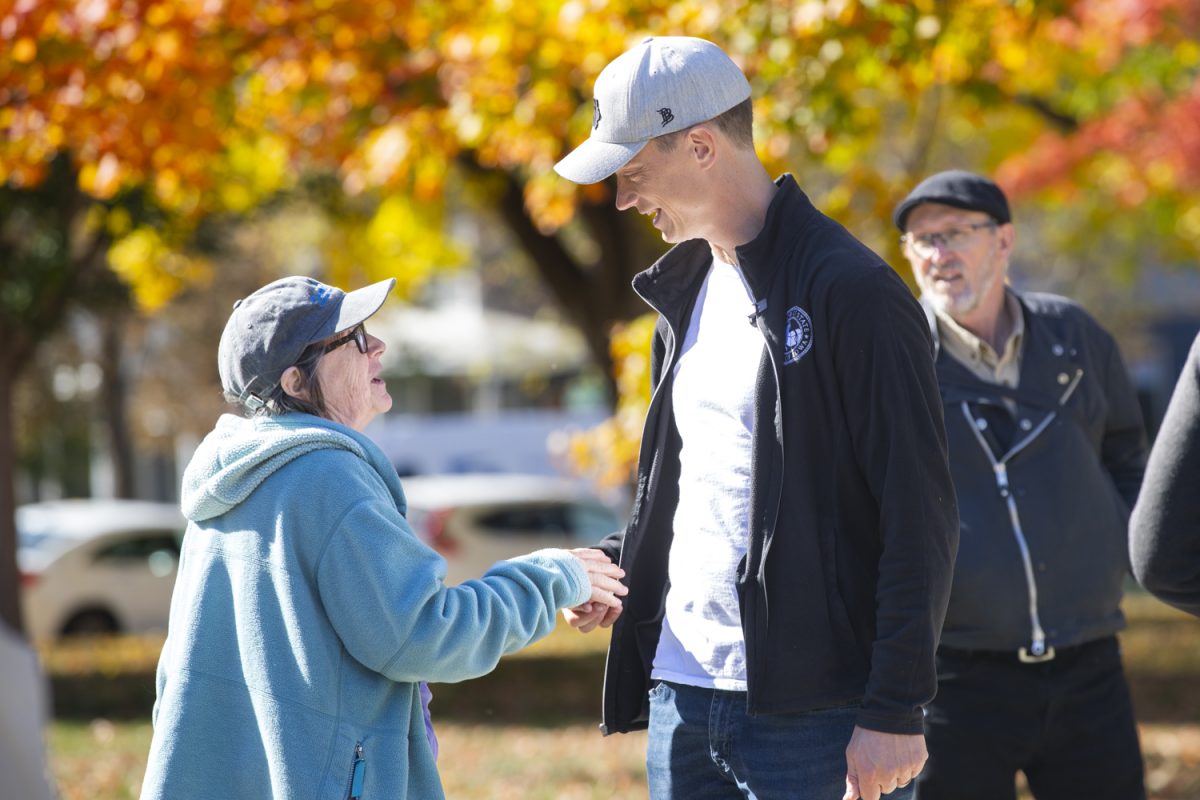Community members gathered at picnic tables and on lawn chairs in College Green Park on Friday. Forming a semi-circle, they sat with eyes pointed at one person only — State Auditor Rob Sand.
Facing this semi-circle, Sand welcomed and thanked the group for their attendance, and then laid out some groundwork. Sand told the group of Iowa City community members that this meeting is one of his 100 town hall meetings a year, and that, despite the upcoming election, he would not be discussing any campaigns or politics.
“Fair?” he asked the crowd.
“Yes,” they responded in unison.
Sand spoke to the crowd with the goal of informing them about the work of the Iowa Auditor’s Office. He started out by discussing the Public Innovations and Efficiencies or PIE chart, which Sand said began during his first term.
Sprinkling in puns about baked goods, Sand said that the goal of the PIE chart is to serve as a framework for state and local governments to increase efficiency and save money for taxpayers.
Sand said that the heart of the program is a policy checklist that is annually sent out to cities, school districts, and counties. Cities, school districts, and counties will check “yes” for the policies that they do have in place, and “no” for the policies that they don’t. This checklist will then be sent back to the State Auditor’s office so that they can take stock of and make recommendations on how to improve efficiency.
The auditor’s office then has a “PIE contest” where they travel around the state to recognize the best-performing cities, school districts, and counties. The goal of the checklist isn’t perfection, though, but rather progress.
“Life, a lot of times, isn’t where you are,” Sand said. “It’s where you are compared to where you started.”
For this reason, the auditor’s office will also be recognizing the most improved cities, school districts, and counties in their PIE contest.
Sand then spoke about other projects that the Auditor’s office is working on. He said that this year the auditor’s office had the opportunity to work with a nationwide nonprofit to try to make sure that job descriptions in Iowa didn’t require four-year degrees where they weren’t needed.
“We have a ton of talented, smart, hardworking people in Iowa that don’t have a four-year degree,” Sand said. “We also have a ton of work that needs to get done for taxpayers. We shouldn’t be putting up arbitrary barriers in front of them.”
Sand also delved into the topic of property taxes, saying that this year his office analyzed not just what property taxes look like locally, but how they compare across the state. Sand said that the auditor’s office took a look at Iowa’s property taxes, and compared income levels across property tax districts.
After comparing income levels across property tax districts, Sand said that the auditor’s office found that lower-income Iowans were paying higher property taxes than their high-income neighbors.
“You oftentimes think those that could afford to pay more are paying more, right? It is actually the opposite,” Sand said.
This information, Sand hopes, will inform policy decisions going forward.
“The truth, I think, is a good thing,” he said.
Sand concluded his speech with a conversation regarding what he called the “big boys” of the fertilizer industry, who Sand believes are too powerful.
“Can the State Auditor’s office do a great deal to stop that?” Sand asked.
“Well, we do what we can,” he answered.
Following Sand’s speech, the semi-circle crowd in lawn chairs clapped and smiled. Many had something to say to the Auditor, ranging from questions like “How can we thank the Auditor’s office” to statements such as “Seems to me like you should be running for governor.” To which Sand responded, deadpan, “Next question.”
The question that gained the most traction with the crowd, though, was the question of private school vouchers.
Sand said that the new school choice legislation, which provides government-funded vouchers for private school education, is designed in a way that makes it almost impossible for the Auditor’s office to intervene.
Sand said that the private school voucher law has just one rule for private schools, they can’t pay a rebate to parents. He said that beyond this, there are no audit requirements, no public meetings, and no public record requirements outlined in the law.
The concern Sand has with this is the lack of transparency, and inability to see how taxpayer money will be spent in private schools under this voucher system.
Sand detailed how each year, his office can pinpoint public school employees who have misspent government funds and reprimand them.
“Maybe they’ll face criminal charges, right?” said Sand, “Because we want money to get spent on education. Period. The difference is that we’re not going to be able to see when it gets misspent in private schools.”
Sand, who is the only Democratic member of Iowa’s executive council, ended his town hall with a conversation regarding the importance of bipartisanship in his work.
Continuing to avoid any questions regarding campaigns or the upcoming election, Sand told the crowd that he welcomes criticism, aspires to have an office where all Iowans feel represented, and ultimately just wants taxpayer money to go where it ought to.



